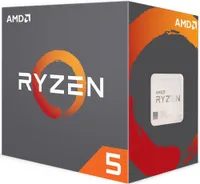AMD Ryzen AMA
Last week AMD joined us for a very special Ryzen AMA. Dive into our lengthy digest to learn about the past, present, and future of Ryzen.
Cooler Brackets, Gaming, and Console Lessons
Awzey: I’m love the new Ryzen architecture, but I still don't understand why AMD introduced a new CPU cooler mounting system for the AM4 socket. Why didn’t AMD continue using the AM3+ bracket design, proven to work just fine on the Asus Crosshair VI Hero Motherboard?
DON WOLIGROSKI: Dude! We gave you the best of both worlds.
We include the AM3+ cooler-compatible retention frame on AM4 motherboards (to the best of my knowledge, all of them come with those retention frames), not just the ASUS Crosshair. Just check the Newegg board pics for socket AM4. They're all over the place. If you want to use the new Wraith Stealth and Wraith Spire coolers just take that retention frame off.
And frankly, spring screws on the AM4 Wraith Coolers are awesome.
paulgrr63: Which Ryzen processor would you recommend for gaming? I use my PC for schoolwork and gaming, but nothing too demanding. The games I play include For Honor, Battlefield 1, World of Warcraft, and Gears of War. Thank you for your time!
DON WOLIGROSKI: In general, the Ryzen 5 1600X is the best Ryzen processor for gaming. It gives nothing up to the Ryzen 7s, since it has the same clocks as the top-of-the-line Ryzen 7 1800X, and it can really beat the Core i5-7600K in certain titles. Having said that, I'd wait for April 11th launch day and look at the reviews before buying. The lower-priced Ryzen 5 1500X might do the job for you. Gaming performance depends on your graphics card, too.
Ditt44: During the mid-2000s most PC game development devolved into a 'console-first' policy, resulting in dumbed-down interfaces, specs, etc. It seems like we’re finally witnessing a reversal to that. With AMD's diversification and integration into console markets, is your company’s development process for CPU and GPU technology based on one market or the other, or is there a more parallel sharing of engineering assets, product features, and architectural designs?
Get Tom's Hardware's best news and in-depth reviews, straight to your inbox.
DON WOLIGROSKI: I think products follow what people want.
There was a time when gamers were a bit intimidated by PCs and the knowledge that was required to run them properly. I think the new generation of gamers aren't intimidated and really see the benefits of the open PC platform. Combine that with the tremendous success of eSports, and the PC is leading the millennium's current gaming renaissance.
As far as base-lines, it's a loop. CPUs and GPUs get better, developers start to take advantage of that power, and then we plateau for a while.
This is why Ryzen is so fricking awesome for gamers. We basically disrupted the PC's landscape by making highly-threaded, high performance CPUs accessible at previously unheard of price points. Now that AMD has brought multi-core processors to mainstream, developers can make use for that hardware as it reshapes the market. It won't be instantaneous, but it's inevitable.
Personally, from a crystal ball standpoint, I think the PC will completely displace consoles someday. Really, consoles are just PCs with simplified user interfaces and better compatibility. We've been moving in that direction since day one, it just takes time.
redgarl: Do you think having console game developers and manufactures reliance on AMD architecture gives your company a serious advantage in performance for the same game on PC running on Nvidia or Intel components?
DON WOLIGROSKI: Being the de-facto console developer does have some advantages, giving developers a lot of incentive to optimize for your architecture. From a CPU development perspective, we are focused on both Radeon and GeForce compatibility first and foremost. We want our customers to be confident that both will work flawlessly on their rigs.
Aspiring techie: What do you think is holding Ryzen's clock speeds back? Compared to Kaby Lake, Ryzen's clock speeds are somewhat sluggish. Do you think that it's something in the architecture or Global Foundry's 14nm process?
DON WOLIGROSKI: If you think about it, Ryzen is an absolute worst-case scenario for clock rates: a brand-new architecture, and a brand-new process. And still we hit 4 GHz without too much trouble.
I believe we have tremendous clock speed headroom to take advantage of as we move forward because of this. Lots of improvements to be made.
MORE: Best CPUs
MORE: Intel & AMD Processor Hierarchy
MORE: All CPU Content
Current page: Cooler Brackets, Gaming, and Console Lessons
Prev Page Versus Kaby Lake, FreeSync TVs, and Frame Latency Next Page Project Scorpio, Versus Core i5, and ECCThe Tom's Hardware forum community is a powerful source of tech support and discussion on all the topics we cover from 3D printers, single-board computers, SSDs, and GPUs to high-end gaming rigs. Articles written by the Tom's Hardware Community are either written by the forum staff or one of our moderators.
-
BugariaM Many people ask clear and technically interesting questions, hoping to get the same answers ..Reply
And they are answered by a person who is far from the technical plane and the engineering questions.
He is a manager, he is a salesman.
His task is more blah-blah, only for the sake of an even greater blah-blah.
Thanks, of course, but alas, I found nothing interesting for myself here. -
genz I intensely disagree Bugariam. All the info he could provide is provided and he asked people actually close to the metal when he did not know. You will not get tech secrets or future insights from ANY AMD or Intel rep on tomshardware; Its far too public and every drop of information here is also given to Intel, Nvidia, and any other competitors hoping to steal AMDs charge. What we did get is a positive outlook on AMD's products.... when you compare that to what we already had from Toms and other publishers who have spent years watching Intel lead and thus don't have faith (or simply got their jobs for their love of Intel) was major.Reply
I personally think he did not remind us that the current crop of 8 core consoles will inevitably force AMD's core advantage to eat all the competition Intel currently has. In 5 years every single Ryzen 1 processor will terrorize the Intel processors they competed with.... Ryzen 5s will have 50% performance gains over Kaby i7 etc etc.
Intel knew this was the future, that is why all Intel consumer processors have stuck to 4 cores to try and keep the programming focus on their IPC lead. Now that that lead is only 6% and the competition has more cores, we will see the shift toward 6+ cores that we saw when Core 2 Duo came and made dual FX and Dual Pentiums viable mainstream gaming chips, and when Core Quad and Nehalem made quad cores viable gaming chips.
As the owner of a 3930k, you can read my past posts and see I have always said this is going to happen. Now, a month after you are seeing the updates come out already. Wait till there are 12 threaded games on the market (this year I expect) and you will see just how much the limitation of the CPU industry's progress was actually created by Intel's refusal to go over 4 cores in the mainstream.
For all the talk of expense creating 6 and 12 core processors, Intel could have had consumer 8 core low clock chips in mainstream for prosumers and home rendering types years ago and they didn't. My theory is that they are scared of heavily threaded applications in the mainstream creating opportunity for competition to outmanouvre their new chips based on slower, more numerous cores. It's not like a 2ghz 6 or 8 core in the mainstream was never an option. -
Calculatron I remember being really excited for the AMD AMA, but could not think of anything different from what everyone else was already asking.Reply
In retrospect, because hindsight is always 20/20, I wish I would have asked some questions about Excavator, since they still have some Bristol Ridge products coming out for the AM4 platform. Even though Zen is a new architecture, there were still some positive things that carried over from the Bulldozer family that had been learned through-out its process of evolution. -
TJ Hooker "TDP is not electrical watts (power draw), it's thermal watts."Argh, this kind of annoys me. "Electrical watts" and "thermal watts" are the same thing here, power draw = heat generated for a CPU. There are reasons why TDP is not necessarily an accurate measure of power draw, but this isn't one of them.Reply -
Tech_TTT Reply19562297 said:Many people ask clear and technically interesting questions, hoping to get the same answers ..
And they are answered by a person who is far from the technical plane and the engineering questions.
He is a manager, he is a salesman.
His task is more blah-blah, only for the sake of an even greater blah-blah.
Thanks, of course, but alas, I found nothing interesting for myself here.
I agree with you 100% ... Ask me anything should include people from the R&D department and not only sales person. or maybe a team of 2 people , Sales and Research. or even better? the CEO him/herself included.
-
genz Reply19566458 said:"TDP is not electrical watts (power draw), it's thermal watts."Argh, this kind of annoys me. "Electrical watts" and "thermal watts" are the same thing here, power draw = heat generated for a CPU. There are reasons why TDP is not necessarily an accurate measure of power draw, but this isn't one of them.
That is simply not true.
Here's an example. 22nm and 18nm TDP is usually far higher than actual draw because the chip is so small any cooling solution has a much smaller surface area to work with. Another example: When Intel brought over onboard memory controllers from the bridge to the CPU socket, the TDP of their chips went unchanged because (thermally speaking) the controller was far away enough from the chip to never contribute to thermal limitations... despite the temperature of the chip rising much faster under OC because of the additional bits, and the chips themselves drawing more power due to more components. A final example: I have a 130W TDP chip that without overvolting simply cannot reach a watt over 90 even when running a power virus (which draws the max power the chip can draw - more than burn-in or SuperPi). The TDP rating is directly connected to the specific parts of the chip that run hot and how big they are, not their true power draw. This is why so many chips of the same binning have the same TDP despite running at lower clocks and voltages than each other.
Further to that, TDP is rounded up to fixed numbers to make it easy to pick a fan. True power draw is naturally dependent on how well a chip is binned, and super badly binned chips may still run with enough volts so they usually add 10 to 20 watts for the thermal headroom to make that possible. -
TJ Hooker @genz I never said TDP is equal to power draw, in fact I explicitly said there are reasons why it isn't. I simply said that "thermal watts" (heat being generated by the CPU) are equivalent to "electrical watts" (power being consumed by the CPU). At any given moment, the power being drawn by the CPU is equal to the heat being generated.Reply
I'll admit, I'm sort of nitpicking a small part of the answer given in the AMA regarding TDP, I just felt the need to point it out because this is a misconception I see on a semi regular basis.


